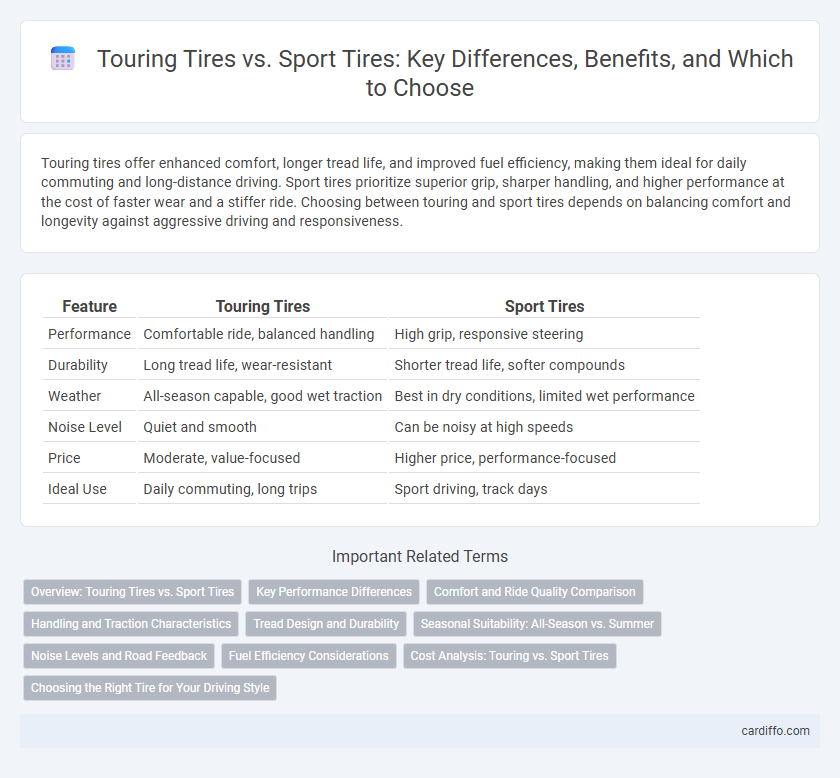Touring tires offer enhanced comfort, longer tread life, and improved fuel efficiency, making them ideal for daily commuting and long-distance driving. Sport tires prioritize superior grip, sharper handling, and higher performance at the cost of faster wear and a stiffer ride. Choosing between touring and sport tires depends on balancing comfort and longevity against aggressive driving and responsiveness.
Table of Comparison
| Feature | Touring Tires | Sport Tires |
|---|---|---|
| Performance | Comfortable ride, balanced handling | High grip, responsive steering |
| Durability | Long tread life, wear-resistant | Shorter tread life, softer compounds |
| Weather | All-season capable, good wet traction | Best in dry conditions, limited wet performance |
| Noise Level | Quiet and smooth | Can be noisy at high speeds |
| Price | Moderate, value-focused | Higher price, performance-focused |
| Ideal Use | Daily commuting, long trips | Sport driving, track days |
Overview: Touring Tires vs. Sport Tires
Touring tires offer enhanced comfort, longer tread life, and better fuel efficiency, making them ideal for everyday driving and long-distance trips. Sport tires prioritize superior grip, handling, and cornering performance, designed for dynamic driving and higher speeds. Choosing between touring and sport tires depends on driving style, vehicle type, and performance needs.
Key Performance Differences
Touring tires prioritize comfort, durability, and all-season traction with optimized tread patterns for smooth, quiet rides and longer tread life, making them ideal for daily commuting and long-distance driving. Sport tires focus on enhanced grip, cornering stability, and high-speed performance through softer rubber compounds and aggressive tread designs, providing superior handling in dry and wet conditions but often sacrificing tread longevity. Key performance differences include touring tires offering improved ride comfort and wear resistance, while sport tires deliver sharper steering response and maximum traction for spirited driving.
Comfort and Ride Quality Comparison
Touring tires are engineered to provide superior comfort and smooth ride quality, featuring softer rubber compounds and optimized tread patterns that reduce road noise and absorb shocks effectively. Sport tires prioritize enhanced handling and grip with stiffer sidewalls and more aggressive tread designs, which can result in a firmer ride and increased road feedback. For drivers seeking a quiet, comfortable experience during long-distance driving, touring tires offer a balanced combination of durability and ride absorption not typically found in sport tires.
Handling and Traction Characteristics
Touring tires offer balanced handling with enhanced comfort and long tread life, providing reliable traction on wet and dry roads for everyday driving. Sport tires prioritize higher grip and responsive handling, featuring softer rubber compounds and aggressive tread patterns designed for superior cornering and braking performance at high speeds. The choice between Touring and Sport tires depends on the driver's preference for durability and smooth ride versus maximum traction and precision in dynamic driving conditions.
Tread Design and Durability
Touring tires feature a symmetrical tread design that enhances comfort, reduces road noise, and promotes even tread wear, making them ideal for long-distance driving and everyday use. Sport tires employ an asymmetrical or directional tread pattern engineered for superior grip and handling at high speeds, often sacrificing some tread life for performance. Durability in touring tires typically surpasses that of sport tires due to their harder rubber compounds and tread depth designed to endure extended mileage.
Seasonal Suitability: All-Season vs. Summer
Touring tires feature an all-season tread compound designed for reliable performance in wet, dry, and light winter conditions, providing enhanced traction and comfort throughout the year. Sport tires utilize a specialized summer rubber compound optimized for maximum grip and responsiveness on warm, dry roads but tend to lose effectiveness in cold temperatures or icy conditions. Selecting between touring and sport tires depends on climate, with touring tires best suited for variable weather and sport tires ideal for high-performance driving in consistently warm seasons.
Noise Levels and Road Feedback
Touring tires offer lower noise levels, providing a quieter and more comfortable ride ideal for long-distance driving. Sport tires prioritize enhanced road feedback and responsiveness, delivering sharper handling but often at the cost of increased road noise. Choosing between the two depends on whether a driver values cabin quietness or precise driving dynamics.
Fuel Efficiency Considerations
Touring tires typically offer better fuel efficiency due to their lower rolling resistance and optimized tread patterns designed for smooth highway driving. Sport tires prioritize grip and handling, which often results in higher rolling resistance and increased fuel consumption. Choosing touring tires can reduce fuel costs and carbon emissions over time without sacrificing everyday driving comfort.
Cost Analysis: Touring vs. Sport Tires
Touring tires generally offer a more cost-effective solution with lower initial prices and longer tread life compared to sport tires, which tend to be more expensive due to advanced rubber compounds and high-performance design. The wear rate of sport tires is significantly higher, often requiring replacement twice as frequently as touring tires, which impacts the overall cost of ownership. Budget-conscious drivers benefit from touring tires' balance of price, durability, and fuel efficiency, while sport tire users prioritize performance despite elevated maintenance expenses.
Choosing the Right Tire for Your Driving Style
Touring tires offer enhanced comfort, long tread life, and quiet performance, making them ideal for daily commuting and long-distance driving. Sport tires prioritize grip, handling, and responsiveness, designed for high-performance vehicles and aggressive driving styles. Selecting the right tire depends on your typical driving conditions and preferences, balancing comfort with performance to ensure safety and optimal vehicle control.
Touring tires vs Sport tires Infographic

 cardiffo.com
cardiffo.com